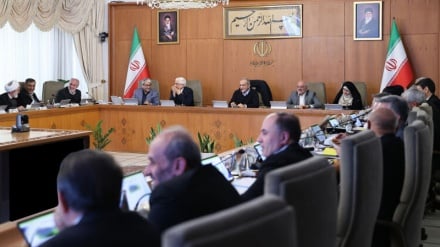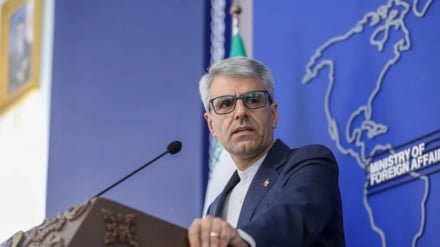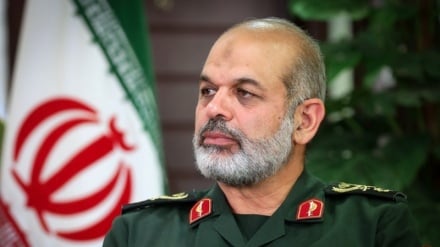Iran, EU relations in post-JCPOA era (1)
The European Union, as one of the main commercial and economic blocs in the world maintains an especial status within the world order. Up until a decade ago, the European Union was one of major parties to Islamic Republic of Iran’s foreign policy, and Iran’s main trade partner.
However, the situation has changed. Few years ago, the two parties’ relations were rather inappropriate. Under the impact of baseless accusations leveled against Iran’s peaceful nuclear activities, the two parties’ relations nosedived into its lowest level within the past three decades.
However, following the conclusion of a nuclear agreement between Islamic Republic of Iran and 5+1 Group member states on July 14, 2015 and enforcement of the Joint Comprehensive Plan of Action (JCPOA) on January 16, 2016, a new chapter of mutual cooperation has been unfolded between the two parties, which can lead to many developments. Given the difference in the cultural values of Islamic Republic of Iran and European Union, the two parties don’t maintain a basis for establishment and maintenance of strategic relationships.
Nonetheless, the status of the European Union in world order, in addition to Iran’s strategic and regional role and status have turned maintenance of appropriate ties between the two parties, a must. The establishment of the sacred Islamic system, upon the victory of Iran’s Islamic Revolution, and focus on Islamic ideology, instead of secular and Western liberal ideology, in addition to Islamic Republic of Iran’s foreign policy outlines such as Islamic Iran’s relentless support for the downtrodden across the world has shaped a major gap between Iran and Europe. Having said that, a number of common grounds remain for maintenance of mutual cooperation.
Given that Iran sits on major oil and natural gas deposits, this country is of paramount strategic importance, worldwide. Iran’s strategic position at the heart of Persian Gulf region and Strait of Hormuz, and Iran’s role as a bridge connecting Central Asia to Persian Gulf waters, attaches further importance to Islamic Iran. The imminent decline in global energy reserves in the future decades, and the surging need of European Union member states to oil and natural gas in the years to come; signify the growing importance of the Persian Gulf and Caspian Sea regions, as a whole, and Islamic Republic of Iran, in particular, in meeting the energy needs of the world and European countries. Some of the other potential domains for mutual cooperation include the environment, anti-drug campaign, tourism industry, and so forth; that in turn could highly contribute to establishment of mutual trust. The said domains are highly conducive in painting an upbeat picture of mutual cooperation between the two parties.
The European Union member states’ foreign policy maintains a number of common elements and parameters. Meanwhile, the study of the role of EU member states’ joint policies in regulation of European Union relations with Iran is important. Within this framework, study of the role of major European Union countries such as France, Germany, and Italy; average European states, such as Spain, Austria, and Netherlands, and lesser privileged European countries such as Portugal, Poland, and Hungary, in ties with Islamic Republic of Iran is of paramount importance. The study of the two parties’ relations shows that after 9/11, an era of détente policies emerged in the relations between Iran and the European Union; which displayed itself mainly in the form of critical negotiations, followed by all-encompassing and constructive talks with the European Union. Seyed Mohammad Khatami, in his two presidential terms, within the framework of détente policies and dialog among civilizations, tried to reinforce the relations between Islamic Republic of Iran and the European Union.
Although adoption of this policy in his first term in office, and the first two years of Khatami’s second presidential term contributed to expansion of Iran’s relations with the European Union; the baseless allegations leveled against Iran’s peaceful nuclear activities by the West in the waning two years of Khatami’s second term in office, left a major impact on Tehran-Brussels ties, and destabilized these ties.
Upon the victory of presidential hopeful, Mahmoud Ahmadinejad in the 9th presidential election in Iran; and adoption of resolute policies for development of Iran’s peaceful nuclear capacity; in addition to announcement of Iran’s stand on Holocaust and a number of other topics, relations between Islamic Republic of Iran and the European Union dropped into an all-time low in the past three decades. Thus, the two parties’ trade plummeted from 29 billion euros in the year 2010 to 14 billion euros in the year 2012. Upon the imposition of illegal oil, banking, and insurance sanctions against Iran, which were enforced on Iran as of July 2012 by the European Union, the two parties’ trade fell to an all-time low of 6 billion euros in the year 2013. Concurrently, the two parties’ political and diplomatic ties sunk to their lowest level throughout these years. In fact, sanctions overshadowed the relations between the two parties.
Ahmadinejad administration which took office after June 24, 2005 elections, tried to adopt an especial approach in global relations, and Islamic Republic of Iran’s ties with the West, especially with the European Union. Upon the study of Islamic Iran’s 16-year ties with the European Union and the West, Ahmadinejad administration concluded that despite the acceptance of some of European Union member states’ requests by Islamic Republic of Iran, the other party continues to make unfounded allegations against Iran, and the West continues to display hostility and enmity against Islamic Republic of Iran. On this basis, Ahmadinejad administration pointed out that the main goal of the Western states is to somehow force Islamic Republic of Iran into submission.
In the meantime, the US, with the support of European Union member states, referred Iran’s nuclear issue to the United Nations Security Council, approving six resolutions against Iran in a period of less than four years in a futile bid to pile up pressure against Iran.
These resolutions were ratified as of July 31, 2006, to June 9, 2010. The reference of Iran’s nuclear issue from the Board of Governors of International Atomic Energy Agency (IAEA) to UN Security Council, has further faded away the role of the European Union in nuclear talks, and has further drawn the attention of Iran to negotiations with countries such as China, Russia, and Non-Aligned Movement’s member states. These factors plummeted relations between the Islamic Republic of lran, and European Union member states throughout the tenures of Iran’s 9th and 10th administrations.
Election of President Hassan Rohani in the year 2013 unfolded a new chapter in Iran’s foreign policy which drew the attention of European countries. Especially, after the conclusion of Joint Comprehensive Plan of Action (JCPOA) between Iran and 5+1 Group member states, which took place within the framework of resolution of Iran’s nuclear issue; Iran-EU ties rose. Several meetings between the two parties’ high-ranking officials in the years 2015 and 2016 manifest the fresh approach which the European Union has staged.
It seems that implementation of Joint Comprehensive Plan of Action maintains a key status in the future perspective of EU ties with Iran. In fact, the European Union member states consider JCPOA as a mechanism and strategy which regulates their future ties with Iran. Iran’s foreign policy is currently at a historical turning point. Currently, Islamic Republic of Iran and the European Union have practically embarked upon constructive, comprehensive, and all-encompassing talks.
European Union is keen to promote interactions, talks, and cooperation with Iran. This development has also been welcomed by the Iranian party. European Union is more motivated than the US for promotion of ties with Islamic Republic of Iran. For instance, several deals worth 50 billion euros were concluded throughout Iranian president’s visit to France and Italy in January 2016; several high-ranking political, parliamentary, economic, and commercial delegations, including the presidents of Austria, Finland, and Bosnia traveled to Iran in the year 2016; and a resolution for normalization of European Union relations with Iran was approved at the European Parliament on October 26, 2016.
Although these resolutions partly maintain a meddlesome and political tone, they call on the European Union to restore its ties with Iran via comprehensive and constructive consultations, on the basis of mutual cooperation. Given the presence of Iran in the geopolitical region of West Asia, European Union has turned toward holding consultations with a powerful country such as Iran, which maintains an elevated status in the region. In the meantime, there are ample potentials for development of the two parties’ commercial and economic ties.
MR/SS


